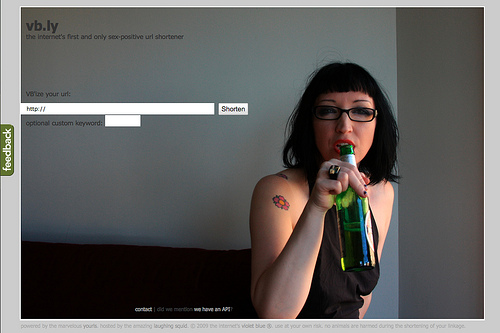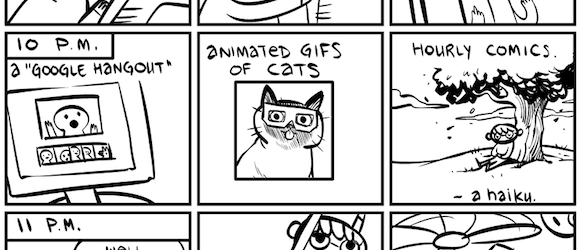Since the advent of URL shorteners bit.ly and ow.ly, .ly has been a suffix of choice for cutesy domain registrants. It’s not widely known, however, that .ly is the country code top level domain of the Libyan government, just as .us is an American country code and .ca is a Canadian one. As such, .ly domains are administrated by the Libyan government, which has led to some criticism of .ly sites in the past on the grounds that they’re implicitly supporting a government that until 2006 was considered by the CIA to be a state sponsor of terrorism.
Ben Metcalfe learned the hard way that Libya’s connection to the .ly domain is more than abstract when his and Violet Blue‘s one-page URL shortener, vb.ly, was seized by the Libyan government without warning.
vb.ly billed itself as the world’s first sex-positive URL shortener, though it in itself contained no obscene content. However, the phrase “sex-positive” and this photograph of sex educator and columnist Violet Blue were considered to be in violation of Sharia law by the Libyan government: (via)

- .ly domains deemed to be in violation of NIC.ly regulation are being deregistered and removed without warning – causing significant inconvenience and damage.
- .ly domains are being deregistered and removed due to reasons that do not correspond to the regulations defined in the official NIC.ly Regulations.
- NIC.ly seems to want to extend their reach beyond the domain itself and regulate the content of websites that use a .ly domain. The concept amounts to censorship and makes .ly domains untenable to be used for user-generated content or url shorteners.
- Libyan Islamic/Sharia Law is being used to consider the validity of domains, which is unclear and obscure in terms of being able to know what is allowed and what isn’t.
- NIC.ly have suddenly decided that <4 letter .ly domains should only be available to local Libyans and this appears to create motivation to recover what premium domains they can to go back into this new local-only pot of domains.
Those last two points seem the most worrisome; however, as TNW points out, they don’t mean that bit.ly’s or ow.ly’s goose is necessarily cooked, although other shorteners that want the .ly suffix will need to cozy up to the Libyan government. “…existing owners of [<4 letter .ly] domains may renew but those premium domains are no longer open for registration by anyone who does not have a presence in Libya. Meaning if you’ve been eying a shiny new .ly domain with one, two, or three letters ahead of the TLD, you need a friend residing in Libya.”
This should be yet another reminder that as free and open as the Internet may seem to be from in front of an American computer screen, there are still plenty of state actors who who exert control over some portions of it and who certainly don’t see it that way.
(Ben Metcalfe via TechCrunch)









Published: Oct 6, 2010 11:06 am